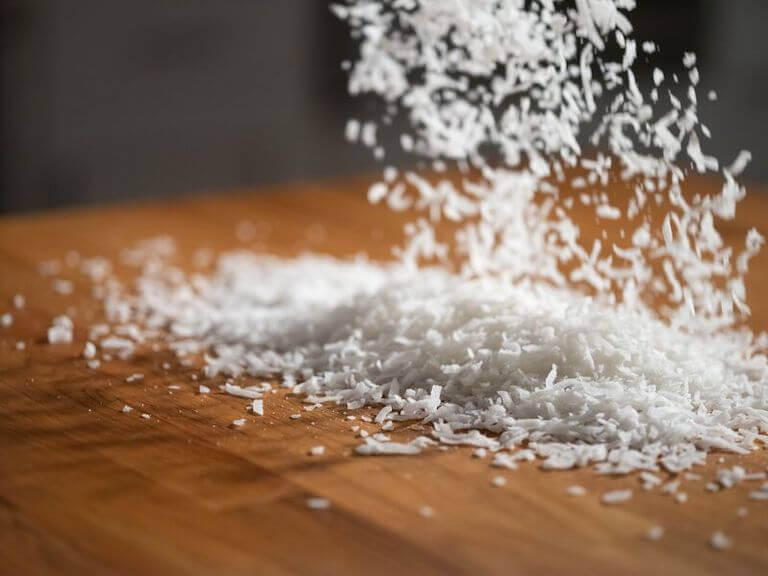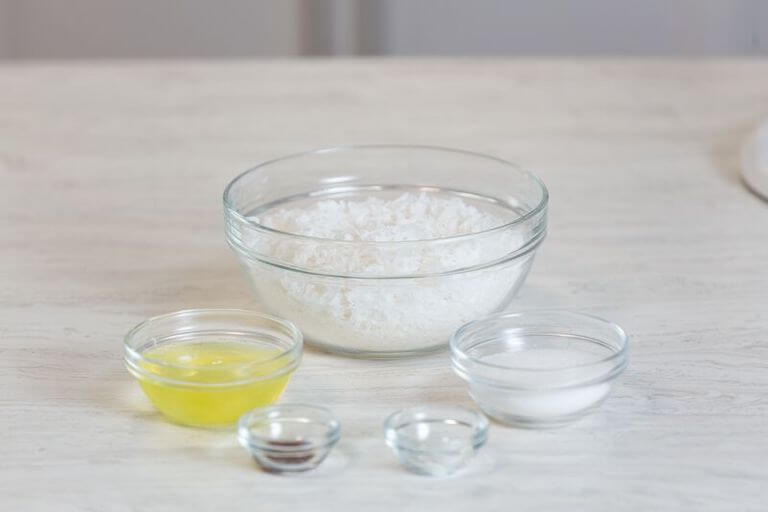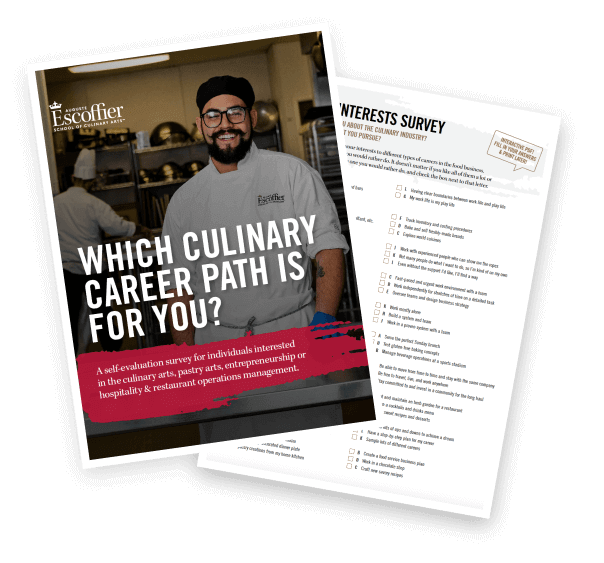Listen to This Article:
With growing awareness around dairy and lactose intolerances, the demand for nut and plant-based milks is quickly surging… in particular—coconut milk! Not only is coconut milk now a favored option in bustling cafes across the country but it’s quickly become a star among lactose-free ingredients in consumer baked goods.
To no surprise, students enrolled in Escoffier’s baking & pastry and plant-based culinary arts programs are discovering how to incorporate nut milk alternatives into everyday recipes to remain consistent with these types of trends!
Intrigued? Let’s take a deeper dive into why coconut milk is all the rage, including its health benefits and how to bake with it!
What Is Coconut Milk & How Is It Made?
Unlike coconut water, which stems directly from undeveloped, green coconuts, coconut milk yields a much thicker, richer, and creamier consistency. It’s also not naturally occurring—meaning it’s carefully concocted using the dense white flesh of ripe brown coconuts then mixed in with coconut water. The flesh-to-water ratio is about 50/50.
Now, compared to other available nut milks, coconut is exceptionally aromatic and nutty, bearing an exotic flair that makes it a culinary phenomenon in Southeast Asia and certain pockets in Latin America and Africa.

When it comes to how coconut milk is made, the process is pretty simple, and sometimes done by hand. After the white coconut meat is removed, it’s grated and boiled in hot water, then strained through a cheesecloth. Depending on how it’s processed, you might end up with different consistencies, falling in the “thick” or “thin” categories.
If you’re picking up “canned” coconut milk to throw into a decadent Thai chicken red curry or luxurious rice pudding, chances are you’ll end up with a consistency that falls right into the middle of that spectrum.
The Health Benefits of Coconut Milk
According to MedicalNewsToday, consuming this sweet and nutty milk presents a litany of health benefits around immunity, heart health, and weight loss. A few studies point to an antioxidant present in coconut milk called lauric acid, which could lower the risk of heart disease and stroke. Lauric acid also holds certain anti-inflammatory and antimicrobial properties, supporting immune function and gut health, while aiding in fighting infection.
Coconut milk also contains medium-chain triglycerides (MCTs) that promote sustained energy, potentially resulting in weight loss and a prolonged satiated feeling after consuming a meal.
So if you’re deciding which plant-based milk to incorporate into your wellness routine, there are good reasons to consider coconut milk first!
Coconut milk nutritional facts**
- Calories: 45
- Total Fat: 4.8g
- Cholesterol: 0mg
- Sodium: 11mg
- Potassium: 50mg
- Total Carbohydrates: 0.6g
- Sugar: 0g
- Protein: 0.5g
**Per 1 cup of unsweetened coconut milk
How to Bake With Coconut Milk
For those with dietary restrictions that include dairy products, baking with coconut milk makes an ideal alternative—mainly because you don’t have to worry about conversions. If your recipe calls for a cup of whole milk, you can substitute it for a cup of coconut milk. However, baking is usually a temperamental process, so there are a few notable nuances when it comes to subbing with coconut milk.
If your recipe calls for whole milk or heavy cream, it’s best to replace it with full-fat canned coconut milk and not the reduced fat variety, in order to emulate the same texture. The same logic applies to using low-fat milk—opt for lighter coconut milk. Now, If you’re attempting to sub for skim milk, don’t use coconut milk since it already contains higher fat content and may tragically ruin your recipe.

Cream of coconut is typically used for things like cocktails and is pre-sweetened. In contrast, coconut cream can be an alternative to heavy cream (usually used to make non-dairy whipped cream, given the fat content, mouthfeel, and viscosity). If someone cannot find coconut cream, you can refrigerate a full-fat can of coconut milk and scoop/skim the fat off the top of the coconut water.
You also might be wondering if you need to alter your baking temperature or time if replacing milk with coconut milk and the short answer is no! If you employ the 1:1 milk to coconut ratio and follow the alternative recommendations, then you should yield the same final result! However, most professional bakers will suggest finding an original recipe that already incorporates coconut milk (just to play it safe).
Lastly, it’s important to make a mental note that coconut milk is intrinsically rich and nutty, which could influence the overall taste of your baked goods.

Take the Culinary Career Survey
We’ve compiled a checklist of all of the essential questions into one handy tool: career options, culinary interest surveys, educational opportunities, and more.
Advantages of Baking with Coconut Milk
As long as the flavor of coconut won’t throw the flavor of a dish off balance, coconut milk can lead to a new twist on a variety of classic recipes. Plus, as a bonus, you can reap a slew of health benefits:
- Nutritional value: Coconut milk is high in protein, vitamin C, folate, and iron.
- Pleasing flavor: Coconut milk has a pleasing flavor that can be emphasized or downplayed based on the recipe.
- Status as a plant-based ingredient: As plant-based diets grow and consumers become more health conscious, coconut milk is seen as an increasingly healthy alternative to dairy.
- No lactose: Coconut milk doesn’t contain the ingredient lactose, which many people cannot tolerate.
- Shelf stability: Coconut milk can be stored for a long time, particularly in powdered form.
Explore Baking with Dairy-Free Milks Under Chef Instructor Guidance
Depending on the Escoffier program you choose, you can discover how to incorporate dairy-free ingredients such as coconut milk into your recipes! For instance, through the Escoffier plant-based program, students can grasp all of the pertinent skills and techniques involved in plant-based baking.
“I’ve had such an amazing experience. It’s been a challenge but the things we learn hands-on and in the reading, lectures, and the live classes… GOLD. I’m even informing my vegan friends about ideas, concepts, and techniques they didn’t know about. I can’t wait to graduate and expand my career.”*
Sophia San Roman, Escoffier Online Plant-Based Diploma Student
If you’re ready to discover more of the latest plant-based food trends through Escoffier, contact our Admissions Department for more program details!
More recipe & technique articles you’ll enjoy reading:
- Best Vegan & Vegetarian Cookbooks According to Professional Chefs
- Plant-Based Chocolate Mousse
- Plant-Based Brownies? Yes, Please!
*Information may not reflect every student’s experience. Results and outcomes may be based on several factors, such as geographical region or previous experience.
This article was originally published on June 12, 2019 and has since been updated.

